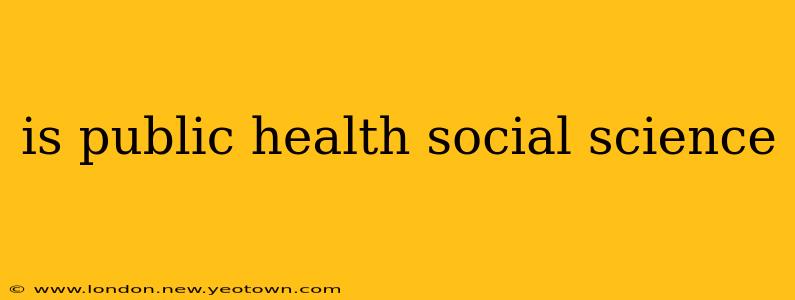Is Public Health Social Science? A Deep Dive into the Intertwined Worlds
The short answer is: yes, public health is deeply rooted in social science. But it's more than just a simple yes; it's a complex and vital interplay. Think of it like a delicious stew—public health is the hearty, nourishing meal, and social science provides many of its essential ingredients. Without the social science spices, the stew would lack flavor and impact.
To truly understand this relationship, we need to explore how social science informs and shapes public health initiatives. Let's delve into some key aspects:
How Does Social Science Contribute to Public Health?
Public health isn't just about viruses and vaccines; it's about the social determinants of health – the conditions in which people are born, grow, live, work, and age. These are profoundly influenced by social factors. Social scientists provide the tools and frameworks to understand these determinants.
Imagine trying to combat the opioid crisis without understanding the social and economic factors that drive addiction. Or tackling obesity without considering the impact of food deserts and socioeconomic disparities in access to healthy food. Impossible, right?
This is where sociology, psychology, anthropology, economics, and political science come in. They help us understand:
- Behavioral patterns: Why do people engage in risky behaviors like smoking or not wearing seatbelts? Psychology and behavioral economics provide crucial insights.
- Social inequalities: How do factors like race, class, and gender affect health outcomes? Sociology and anthropology offer valuable perspectives.
- Policy and politics: How can we design and implement effective public health policies? Political science and economics guide the process.
- Community engagement: How can we effectively engage communities in public health initiatives? Anthropology and sociology are vital in understanding cultural contexts and community needs.
What Specific Social Science Disciplines Are Involved?
Let's explore how individual social science disciplines contribute to public health:
- Sociology: Examines social structures, inequalities, and their impact on health outcomes, helping us understand disparities in access to healthcare and health behaviors.
- Psychology: Focuses on individual behavior and mental health, contributing to interventions aimed at promoting healthy behaviors and addressing mental health crises.
- Anthropology: Provides a cultural lens, crucial for understanding diverse populations and tailoring public health interventions to specific communities and their unique needs.
- Economics: Analyses the costs and benefits of public health interventions, guiding resource allocation and policy decisions.
- Political Science: Studies power dynamics and policy processes, helping shape public health legislation and advocacy efforts.
Are There Specific Examples of Social Science in Public Health?
Absolutely! Let's consider a few real-world examples:
- Understanding the spread of infectious diseases: Social networks and community structures influence how quickly diseases spread. Epidemiologists often work with sociologists and anthropologists to understand and model these patterns.
- Designing effective health campaigns: Psychologists and communication experts work together to create compelling messages that encourage healthy behaviors.
- Evaluating health interventions: Researchers from various social science disciplines use quantitative and qualitative methods to assess the effectiveness of public health programs.
- Addressing health disparities: Sociologists and economists analyze the root causes of health inequalities and propose solutions.
What are the Limitations of Using Social Science in Public Health?
While social science plays a crucial role, it's not without its limitations. Gathering and analyzing social data can be complex and resource-intensive. The findings may not always translate directly into policy changes due to political or economic factors. Cultural nuances and differences also require careful consideration in developing and implementing programs.
In conclusion, public health is intrinsically linked to social science. The two are inseparable partners working towards a common goal: improving population health. It's a dynamic, evolving relationship, constantly adapting to new challenges and insights. The future of public health relies heavily on the continued collaboration and integration of these disciplines.

